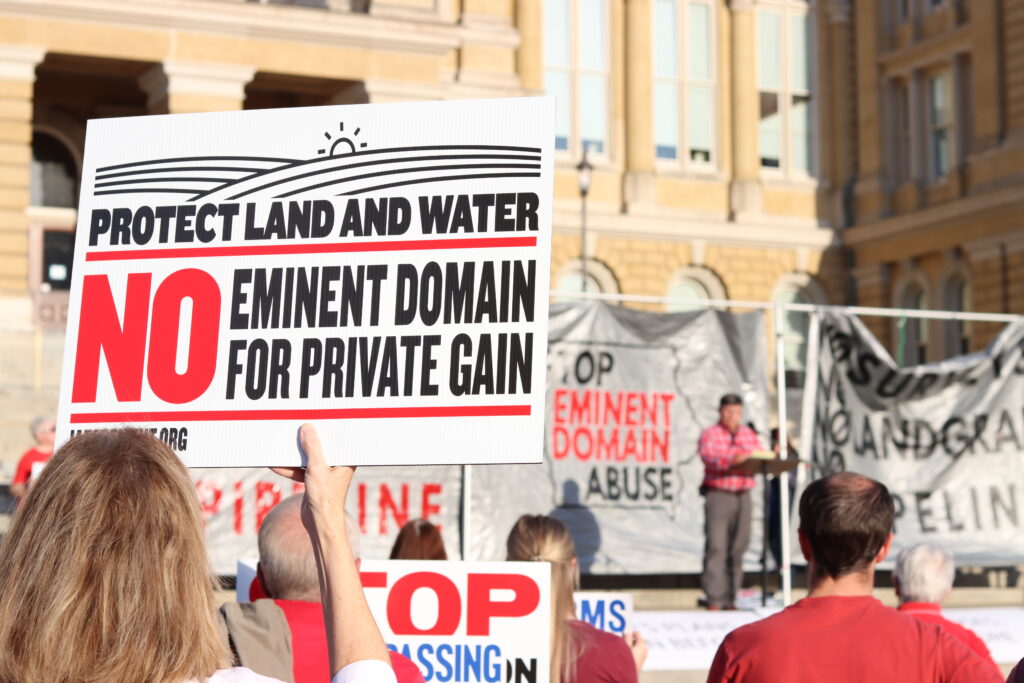Close to 80 people gathered outside the Iowa Capitol Oct. 8 for a demonstration against the Summit Carbon pipeline before a Supreme Court hearing. (Photo by Cami Koons/Iowa Capital Dispatch)
The Iowa chapter of the Sierra Club and some landowners called Tuesday for the Iowa Utilities Commission to reject Summit Carbon Solutions’ petition to amend its pipeline permit.
The petition, filed Monday, requests changes to the initially proposed route and pipe size for the carbon sequestration pipeline project, which had been approved by the IUC in 2024. That approval came with requirements that Summit could not begin construction until it received route permission from North Dakota and South Dakota, and storage permission in North Dakota.
Since the IUC’s initial approval, South Dakota has enacted a law preventing the use of eminent domain in CO2 pipeline projects, and has denied two of Summit’s permit requests. In North Dakota, Summit’s permits were approved, but are facing legal challenges.
In light of these actions in other states, Summit has requested to amend the permit in Iowa, changing language to reflect that “additional options for storage and pathways to storage are developing and may provide a better solution.” The request would remove language referencing North Dakota and South Dakota, changing the petition to state construction cannot begin until it has “secured access to one or more sequestration sites and permits or agreements to allow it to reach such storage.”
Landowners and advocates who oppose the pipeline project or the use of eminent domain in gaining land easements necessary to complete the route, released statements Tuesday calling for the IUC to reject the proposed language change.
Though Summit said in its petition that the move away from state-specific language would not diminish “protections against a ‘pipeline to nowhere’” in the permit, people opposed to the project said the shift is too substantial of a change to be approved as an amendment, while criticizing the business for not providing further details on a new route or storage options.
“This isn’t an amendment, this is a last-ditch effort and half-baked proposal for an entirely new project because South Dakota said no,” Wally Taylor, attorney for the Sierra Club Iowa Chapter, said in a statement. “Summit needs to realize that Iowa is saying no, too.”
Brian Jorde, an attorney with Domina Law Group representing landowners with Bold Education Fund’s Iowa Easement Team, called for Summit to withdraw its application for the “Phase 2” route in Iowa. He also said the company should surrender its permit approvals in Iowa and North Dakota, “which were predicated on a plan and route that no longer exists.”
“If Summit truly wants a ‘fresh start,’ they need to come clean with the public, regulators, and landowners about their plans, and start the application process over with a viable route that identifies specific sequestration sites and any ‘industrial use’ partners,” Jorde said in a statement.
Iowa Renewable Fuels Association Executive Director Monte Shaw criticized the comments from Jorde and the Sierra Club in a statement while expressing support for Summit’s petition.
“As we noted when South Dakota changed their law, there are many places to sequester carbon and there are many ways to get to those locations that do not involve South Dakota,” Shaw said. “It seems to us that Summit’s permit request simply reflects that.”
Though there has been opposition to the project, Shaw said a “super majority of impacted landowners have expressed their support for the project through voluntary easements,” and said the IRFA will continue to support “fair treatment” for carbon capture projects while supporting the protection of landowners rights.
“The demand for ultra-low carbon ethanol is expanding around the world, and we do not want Iowa left out,” Shaw said. “When the carbon sequestration project in Nebraska begins operations this fall, Iowa will lose its 25-year crown as the world’s most profitable place in the world to turn corn into ethanol. There are serious economic ramifications that will follow if that is allowed to last. IRFA will work to ensure Iowa returns to the top while Sierra Club relishes the thought that Iowa’s rural economy will be further diminished.”
In addition to the petition to amend the Iowa permit, Summit announced a community and landownership partnership program Monday, including updated commitments related to safety, transparency and increased benefits for landowners and counties where the pipeline route is planned.
“We’re fully committed to making this project work the right way going forward,” the letter, sent to county supervisors, county emergency managers and landowners, said. “We also realize our significant investment will only be successful if it’s built on genuine partnership, and we know that success depends on working side-by-side with communities and landowners along our route.”
But some landowners opposed to the project, including Kim Junker of Butler County, said Tuesday the newly announced incentives are an attempt to “sweeten and distract from our biggest concerns about the project.”
“Summit is still trying to place a dangerous pipeline near our homes. Summit is still trying to abuse our property rights through the use of eminent domain. Summit is still aiming to take our tax dollars for their privately-owned project. Summit is still threatening our land and our water,” Junker said in a statement. “Nothing about that has changed. This project is still all risk and no reward.”
This story was originally produced by Iowa Capital Dispatch, which is part of States Newsroom, a nonprofit news network which includes South Dakota Searchlight, and is supported by grants and a coalition of donors as a 501c(3) public charity.


